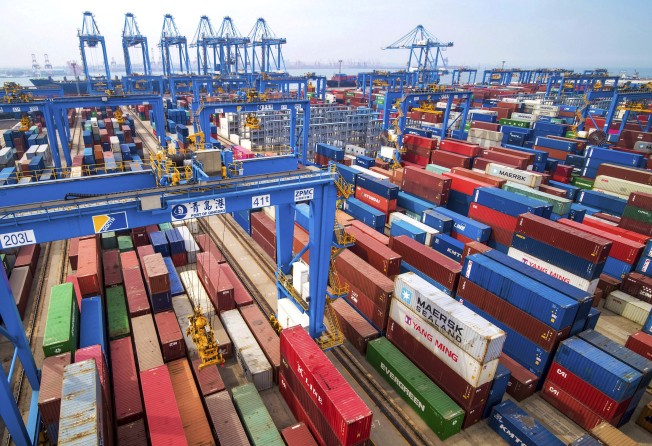China’s October exports may offer hint of ‘stabilisation’, but still ‘hard to be optimistic’ amid US trade war
- Exports fell by 0.9 per cent in October, better than the 3.2 per cent drop in September, and better than analysts had expected
- Imports continued to struggle, falling for the ninth time in the last 10 months, as the economic pressure on Beijing continues to pile up amid the trade war with the US

China’s exports fell for the third month in a row in October, the worst run since 2016, but while the smaller than expected drop hinted to some at a possible ‘stabilisation’, most analysts remained cautious suggesting that it was still “hard to be optimistic about the outlook”.
Exports declined by 0.9 per cent in October, a better result than the 3.9 per cent drop predicted by economists in a Bloomberg survey, according to data released on Friday. The October result was also better than September’s 3.2 per cent fall.
The modest decline could be seen as a sign that China’s export economy is starting to stabilise, helped by the prospect that the “phase one” trade deal with the United States could lead to a reduction in tariff levels over time, some analysts said. However, they cautioned that more data is needed to confirm such a trend.
“There are some signs of stabilisation for exporters. And with the possible rollback of tariffs, next year is very likely to stage a recovery for exports,” said Gai Xinzhe, a senior analyst at Sino-Ocean Capital in Beijing.
Others projected that exports would continue to deteriorate in the months ahead, with or without tariff reductions contained in the interim trade deal, as existing levies increasingly weigh on the margins of Chinese exporters and US importers.
“It is still hard to be optimistic about the outlook for the overseas demand against the background of a continuing global trade slowdown, rising trade tensions with the US and EU, and the weakening of the US economy, despite the progress in the US-China trade talks,” said Liang Zhonghua, chief micro analyst at Zhongtai Securities.
It is still hard to be optimistic about the outlook for the overseas demand against the background of a continuing global trade slowdown, rising trade tensions with the US and EU, and the weakening of the US economy, despite the progress in the US-China trade talks
The Chinese Customs Administration’s news release suggested that its effort to diversify its exports to other countries – particularly those involved its flagship Belt and Road Initiative that is designed to connect China with the Middle East, Africa and Europe through a series of high-profile infrastructure projects – was bearing fruit and helping to offset the sharp decline in shipments to the US.
Exports to the US dropped 11.3 per cent in the January to October period, while exports to the European Union rose 5.1 per cent and those to the 10-member Asean bloc jumped 10.4 per cent.
The modest drop in exports in October was a second piece of positive data on the Chinese economy in the last week after the Caixin/Markit manufacturing purchasing managers’ index (PMI) rose in October for the fourth straight month to the highest level since February 2017.
A slower pace of decline in exports in October offers some encouragement for the economy’s performance heading into year-end
“A slower pace of decline in exports in October offers some encouragement for the economy’s performance heading into year-end. That said, a continued slide in imports, coupled with contraction in the new orders component of the official manufacturing PMI, suggest domestic demand remains weak – tempering any optimism about growth bottoming out near term,” added Gai from Sino-Ocean Capital in Beijing.
China’s imports fell for the ninth month in the 10 months so far this year, dropping 6.4 per cent in October, al though the decline was smaller than analysts’ expectations for a 7.8 per cent decline. It was also lower than September’s 8.5 per cent slump.
“The downward pressure on the Chinese economy is still relatively large. Chinese monetary policy still needs to be loosened [to offset the economic slowdown],” added Liang from Zhongtai Securities.
The better export performance comes amid rising optimism that China and the US will soon reach an interim trade deal that would lead to tariff cuts that would help both the US and Chinese economies.
On Thursday, China’s Ministry of Commerce spokesman Gao Feng confirmed that both sides had agreed in principle to remove some of the trade war tariffs, should an agreement be reached, after a week of back and forth in which the substance of a phase one deal has been the subject of intense media scrutiny – as has the potential venue for a signing ceremony.
“In the past two weeks, top negotiators have had serious and constructive discussions on resolving issues of core concern. Both sides agreed to remove the additional tariffs imposed in phases as progress is made on the agreement,” Gao said.
Top White House economic adviser Larry Kudlow later confirmed the agreement on tariff reductions. Global stock markets rallied on Thursday on the news, while the yuan strengthened to a three-month high.
Although both the US and China have tried to send positive signals, it is unlikely that the world’s two largest economies will be able to sign the interim deal this month – as some had hoped. Given the schedules of Chinese President Xi Jinping and his US counterpart Donald Trump, it is more likely they will meet in December to sign a deal, if the final details can be agreed.
Negotiators are working to complete the agreement so it can be signed before December 15, when new 15 per cent tariffs on about US$160 billion of Chinese imports – including smartphones and other popular consumer products – are due to take effect. It is expected that that tariff increase would be postponed indefinitely as part of the interim trade deal.